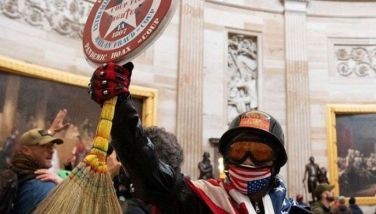Kerry urges Kosovo to stick to deals on ethnic Serbs, border
PRISTINA — US Secretary of State John Kerry delivered a message of support for Kosovo's government yesterday, urging it to stick to agreements that would provide ethnic Serbs greater autonomy and demarcate the young nation's border with neighboring Montenegro. He decried efforts by opposition lawmakers to scuttle both deals through intimidation.
Kerry also sought tougher action by the government to prevent Kosovars from joining the flood of foreign fighters joining the Islamic State group in Iraq and Syria. The Muslim-majority country, born out of Yugoslavia's violent breakup in the 1990s, has seen a greater percentage of its citizens fight for IS than any country in Europe.
Stopping in Pristina for less than two hours after leaving a meeting of NATO foreign ministers in Brussels, Kerry backed Kosovo's efforts toward closer cooperation with its neighbors and said the twin agreements wouldn't threaten the country's security or independence. "We have invested far too much, ourselves, together, in Kosovo's future to put it at risk," he said after meeting Prime Minister Isa Mustafa and other senior officials.
The US and its NATO allies carried out a bombing campaign between March and June 1999, designed to force Serbian forces out of Kosovo and get Belgrade to accept the deployment of a NATO peacekeeping force.
The accords have plunged Kosovo into political crisis. Earlier this week, opposition lawmakers broke up a parliamentary session with tear gas, saying they would block proceedings until the government renounced its intention to give Serb communities greater powers and to define its 50-mile long eastern boundary with Montenegro. The opposition has regularly disrupted parliament with pepper spray, whistles and water bottles as well, and is now vowing street protests. Mustafa's government accuses the opposition of trying to seize power by force.
Parliament, Kerry said, is "where meaningful debates on public policy are conducted, where people can listen to each other peacefully."
"That is not the place for tear gas," he said. "And it is not the place for intimidation."
Kosovo and Serbia have been holding European Union-mediated talks to overcome their differences. Serbia still rejects Kosovo's 2008 declaration of independence. The deal on Serb minority rights is suspended until Kosovo's constitutional court rules on its legality.
Kerry's words carry weight in Kosovo, a bastion of pro-American sentiment. Since Kosovo's independence, the United States has provided $950 million in assistance — much of that to support good governance and democracy. Despite not venturing beyond Pristina's airport, Kerry was greeted with welcome banners, American flags, an honor guard and a long red carpet.
"Kosovo deserves a longer trip," said Kerry, who flew in from Brussels, where he pressed America's 27 NATO allies to make stronger military commitments to defeat the Islamic State group in Iraq and Syria.
The top American diplomat continued on the theme in Kosovo, saying the country "has set a powerful example for the region with high profile arrests and even stronger legislation to combat extremism." But he said the job wasn't done in a place beset by unemployment, corruption and other woes, and where 60 percent of the people are under age 30.
"More needs to be done," Kerry said, specifically on fighting back against the Islamic State's "false promises of glory that extremists use to lure away your young people."
- Latest
- Trending






























